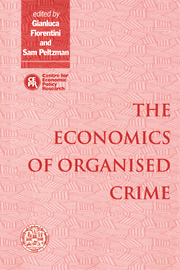Book contents
- Frontmatter
- Contents
- List of figures
- List of tables
- Foreword
- Acknowledgements
- List of conference participants
- 1 Introduction
- PART I THEORIES OF THE STATE AND THE ORIGIN OF CRIMINAL ORGANISATIONS
- PART II THE CRIMINAL ORGANISATION AS A FIRM
- PART III ORGANISED CRIME AND STATE INTERVENTION IN THE ECONOMY
- PART IV DETERRENCE POLICIES AGAINST LEGAL FIRMS INVOLVED IN ILLEGAL ACTIVITIES
- PART V DETERRENCE POLICIES AGAINST ORGANISED CRIME
- 10 Regulating the organised crime sector
- Discussion
- 11 Oligopolistic competition in illegal markets
- Discussion
- Index
Discussion
Published online by Cambridge University Press: 04 August 2010
- Frontmatter
- Contents
- List of figures
- List of tables
- Foreword
- Acknowledgements
- List of conference participants
- 1 Introduction
- PART I THEORIES OF THE STATE AND THE ORIGIN OF CRIMINAL ORGANISATIONS
- PART II THE CRIMINAL ORGANISATION AS A FIRM
- PART III ORGANISED CRIME AND STATE INTERVENTION IN THE ECONOMY
- PART IV DETERRENCE POLICIES AGAINST LEGAL FIRMS INVOLVED IN ILLEGAL ACTIVITIES
- PART V DETERRENCE POLICIES AGAINST ORGANISED CRIME
- 10 Regulating the organised crime sector
- Discussion
- 11 Oligopolistic competition in illegal markets
- Discussion
- Index
Summary
‘All punishment is mischief: all punishment in itself is evil.’
Jeremy Bentham, Principles of Morals and Legislation
In ‘Economics and Criminal Enterprise’, now a chapter in his Choice and Consequence (1984), Tom Schelling suggested that ‘a good many economics and business principles that operate in the “upperworld” must, with suitable modification for change in environment, operate in the underworld as well’. The paper by Celentani, Marrelli and Martina (CMM, for short), like most of the recent literature on the subject, shows how one of these principles can be applied to the economics of criminal activity. In particular, they try to show how the idea of achieving a pseudo-cooperative outcome through non-cooperative behaviour can be usefully introduced in this field. It is indeed well known that, thanks to the repeated interaction among rational agents – modelled through supergames – the Pareto-inefficiency of Nash equilibria can be overcome, and this intelligent paper shows how crime repression can be improved by explicitly considering this possibility.
The supergame this paper considers is one between the government and two criminal organisations operating in a ‘victimless’ sector. The government aims at minimising the aggregate profits of the firms, and pursues its goal by spending in each period either nothing, or a given sum of money to attack one of the two firms. In each period, no more than one firm can be attacked by the government, and this determines the probability (either 0 or γ) that a firm is ‘terminated’ in that period. Notice that the government really never ‘wins’, as it is assumed that, whenever a firm is ‘terminated’ another (identical) one appears on the scene; otherwise, no entry is considered.
- Type
- Chapter
- Information
- The Economics of Organised Crime , pp. 269 - 273Publisher: Cambridge University PressPrint publication year: 1996

